#a whole lot of meta
Text
The thing about having read our way through two previous books full of necromancers and weird eldritch shenanigans is that the absolute horror of what happens to John as a person doesn't quite register.
John's own glib, matter of fact narration tells the story as an apotheosis. He was doing great. He'd have fixed everything if only people had listened.
But reading between the lines in the John chapters, you glimpse something rather different.
John basically spends the first half of the Jod chapters sitting in the dark with his creepy yellow eyes, not eating or sleeping, literally stroking his favourite corpses and coming out with chill and fun statements about how he can feel their skin when he's away from them and he's 'waking up'. Cool, cool.
Passing swiftly over the cow dome, Presidential Puppet Pals, and the suitcase nuke, day to day life in the cow dome must have been fun... You're all on the Interpol watchlist, the Vatican is asking a lot of questions, the police are outside and John - who hasn't slept in a week and doesn't eat anymore and is probably wearing some kind of weird novelty tshirt - comes wandering past while you're eating breakfast, followed by a dozen silent, dead-eyed corpses like some kind of mother hen. He makes a cow joke, and then zones out because he got distracted by listening to the bacteria in your gut.
And then some guys die accidentally and it turns out he can eat death energy. So now he's got creepy Twilight eyes, an entourage of corpses, a cape, some very dodgy eyeliner, and he's barely breaking a sweat as he instantly kills over 100 people, says it was an accident, and then, dead serious, tells his followers to drag dead UN peacekeepers inside to add to his 'skeleton army'.
By the end, he's not slept or eaten in weeks, is tweaking his own bodily processes on the fly, is puppeting the dead US president and possibly an army of over a hundred corpses, monitoring G- in Melbourne, carrying on at least two conference calls, and helping to build barricades out of chairs.
And I just keep thinking how weird it must have been for his friends. How sometimes he would have seemed like the man they'd known and loved for so long, and sometimes he would seem different. Did they ever find themselves mourning the man he was? Did they ever stand there as he tuned into something they couldn't fathom, staring at them with those yellow eyes, and feel some awful, uncanny valley terror? Did he ever feel like he was losing himself? At what point did the cow jokes stop feeling like oh, classic John and start to be a reminder that his desire for vengeance and the scope of his powers were outstripping his remaining...perspective?...restraint?...humanity?
#the locked tomb#tlt#tlt meta#john gaius#We think about eldritch Alecto lots#but I think John's whole 'I'm just a guy' routine sometimes obscures that in many respespects he's just as unsettling
5K notes
·
View notes
Text
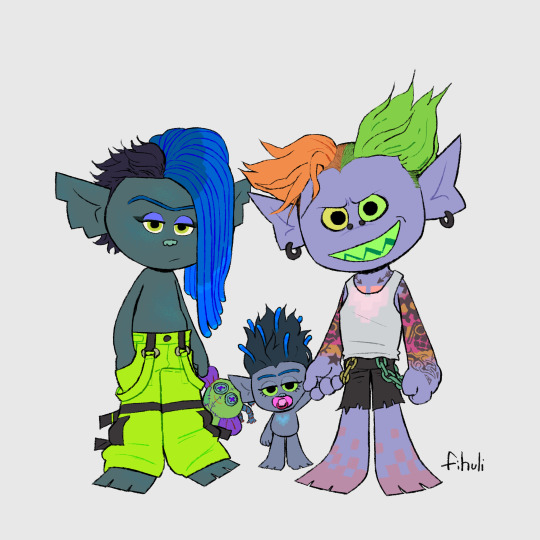
Meta & Flint, the freaks who named their daughter Oblivion.
Don't let their looks fool you, they are actually good parents. (Maybe "okay" parents, they did let Liv run away with her boyfriend they never met and his band at 15. (But she was responsible and called them to explain her decision and that she already talked with the school and will be taking special exams at the end of every semester, so it's all good lmao.))
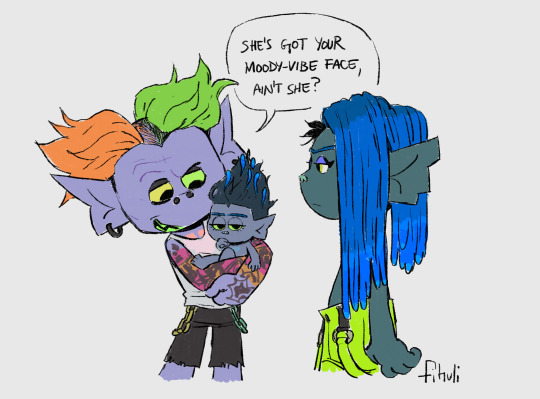
In my AU the Techno/Rock Trolls are the largest population of mixed trolls. They live concentrated along the shore between the Rock and Techno Kingdoms and also extending north into the no-man's-land on the map. This whole area is simply referred to as "the Shallows". They have their own communities and villages there which are located partially on land or exposed reefs/rocks and partially in the water.
Liv grew up in one of those villages. Her parents own a small apartment carved into a cliff side above the ocean. Personally they prefer walking over floating/swimming, and they can't stay in the sun for too long either (they all inherited sun sensitive skin from their Techno sides) so this way they're mostly on land and also aren't in direct sunlight after noon.
It's a modest home but I imagine they must have the prettiest sunrises.
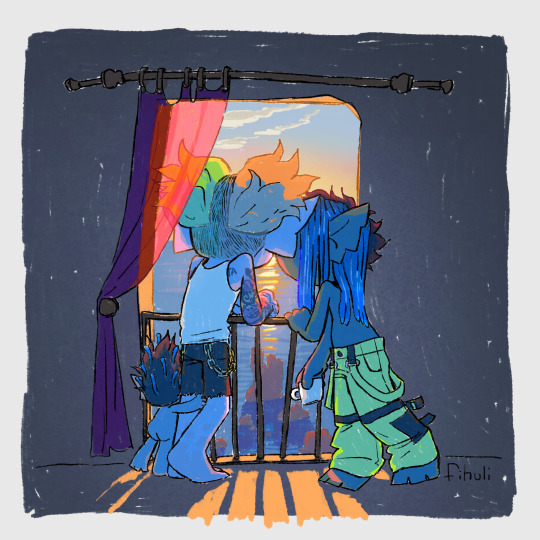
Despite the Shallows having their own communities they still belong under the Rock Kingdom which doesn't really care about them or their different needs much, so a lot of the trolls living there are very anti authority.
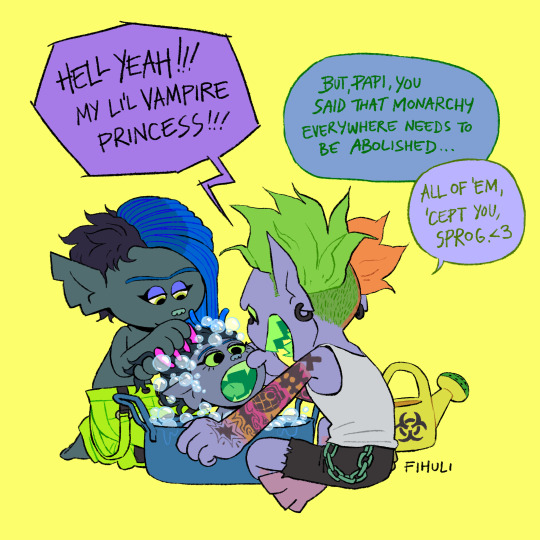
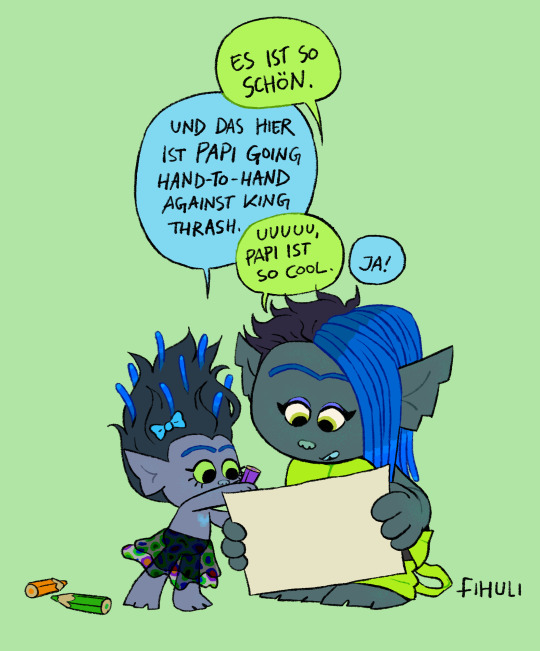
#me taking advantage of my baby level knowledge of german lmao#but i always liked the idea of liv having a vague european accent#so i've decided to give her dad an british 'england' accent and her mom a german accent/make her german speaking#trolls#dreamworks trolls#my art#ex bandmates#trolls oc#liv#flint#baby liv thought her goblin spawn of a dad is the prettiest troll in the world kjsbdhbfh#meta#the parents and a lot of trolls there are very anti authority. they're technically living in part of the rock kingdom and are expected to#be like regular citizens when it comes to stuff like paying taxes etc. but no money actually makes it back into their communities...#Flint's genre is Electropunk#and Meta's genre is Industrial Metal#Liv is more Industrial Metal but there's definitely some Punk vibes in her style#this started as just me designing her parents and it's turned into a whole info dump
217 notes
·
View notes
Text
I have to wonder about the order of the arrival of the gods' avatars in Exandria, in particular Ayden. Because he's so young. He feels older than his years, but he also feels young in the sense that he is still experiencing the world—he intervenes as often as he is able and is not shy about ending with the small community that they are soon leaving, he is most affected by suffering and injustice. There is a pity borne of his divine point of view, yes, but even comparing him to Trist, who has obviously embraced the mortal world and ingrained herself within it, or S.I.L.A.H.A., who has gone out of his way to experience the wonders of the city that has driven them to such drastic lengths but who seems distantly resigned to its destruction, Ayden feels impressed upon by the circumstances of the world in a way that is much more youthful.
It seems that there was some amount of plan around who arrived when, but it wasn't all that specific beyond Ioun scouting ahead in Aeor, and was otherwise based on their own decision or whim. Why did Pelor wait so long to go? Had he hoped that perhaps the issue would be resolved before it became necessary—before the light of Exandria was sequestered away in a mortal form? Was he wary of growing too used to being mortal, to becoming attached to his life even beyond Trist, who leaves her family ruefully but resolutely all the same?
Ayden walks as though he cannot help but let the world touch him, but he doesn't seem to have companions of his own, instead traveling with Trist's family. They have left their home recently enough that Trist is still wearing her husband's overcoat rather than her own, and he goes without, suggesting that they have fled recently and with haste. In contrast, Ayden makes no mention of parents or a family, though he is young enough that he should still be with them. In this time of war, it is simple to wonder if they've been killed in its path, perhaps before Ayden was aware of the hand he'd had in its making. He carries little, and the shield he has seems to be—at least looks—worn and broken. It's quite likely that it too was created in response to this war, as much as Ayden himself. He looks to his sister and her mercy like a north star.
He feels both new to and impressed upon by the world, and I have to wonder how forcefully he is holding himself apart from its suffering, even as he intervenes often enough that he risks giving himself and his family away—not because he is afraid to experience it, but because he already has. He understands that he is fighting for this world even as he and his family is the cause of its strife. Aeor may offer the gods the mechanism by which to separate themselves from the world they've shaped, but I wonder if having the perspective of Ayden will give Pelor the resolve and the reason to choose it.
#listen as a person who has thought a LOT about anamnesis i am just. AUGH.#tell me about what THAT adolescence was like gdi#like CHRIST#critical role#cr spoilers#ayden#cr downfall#also for the record it is SO cruel and unusual for cr to air this during my most off the grid week of the whole year. fucked up#had to copy this into notes just in case Tumblr ate it while i tried to post#cr meta
224 notes
·
View notes
Text
elphaba has such an intriguing relationship with her magic in the musical. like. imagine having this mysterious power you can't control and you don't understand and obviously nobody is going to help you understand it because everyone completely fucking hates you.
and elphaba wants so badly to control these powers she promises nessa that once they're at shiz things will be different and she won't use them but she doesn't KNOW how to do that. so this is yet another part of her that scares people or makes them angry at her, and it's yet another part of her that she has no control over.
it's fucked that she admires the wizard also. because she thinks the wizard has magic but of course that's a good thing. magic isn't the problem. the problem is her magic. she never even considered a career in sorcery because her magic is more a curse than a gift.
and we know her magic is tied to her emotions and it comes out when she's mad or frightened. can you imagine how many times she must've gotten mad growing up, considering how hard her life was? and how many times her powers manifested without her control? it must've happened a LOT if she had to promise nessa she wouldn't use her magic again. and how many times she stopped herself from getting mad in the first place because she was afraid of what she could do?
also elphaba tells morrible "something just comes over me sometimes. something i can't describe. but i will try to control myself." and then she apologizes to nessa. she apologizes for something she can't control, something she has clearly tried to control before, smothering down a part of her that should be natural, that should be considered a talent.
and a part of me thinks that she grew to resent her magic so thoroughly she carried that resentment even after getting training from morrible. after her lessons and after getting the grimmerie all the magic we see from elphaba is more "controlled" so to speak.
but still think about the scene at the governor's manor, when she purposely enchants nessa's shoes and she says "FINALLY from these powers something good" so even after all that time she still never saw her own powers in a positive light. and i mean. with the wizard and morrible tricking her to fuck up the monkeys of course she thinks like that.
she went from having to hide her powers, to trying to suppress them to make the people around her more comfortable, to being hunted because of her powers. of course she's never going to see that side of herself as something good. the amount of self-loathing she carries is just unreal i don't know how to finish this post but i love her very very much and she needs a hug.
#elphaba thropp#wicked#wicked musical#not going to talk about the whole scarecrow thing because this is an elphaba post but even when she saved fiyero's life you could tell#she wasn't entirely satisfied with the way she did it#also i wish we could've seen more of her reaction to turning boq into the tin man. she kinda just bolts without a word about him lol#hope the movie goes this route it already looks like they're going to touch on elphaba's magic a lot more#wicked meta
269 notes
·
View notes
Text
I’m glad Maes Hughes died.
He’s a fan favorite character and I enjoy him a lot too, but I think fundamentally he’s a character who has to die. His role in the narrative is to haunt it.
I might be even more of a weirdo because I enjoy his manga characterization over his Brotherhood or ‘03 portrayal, but I love the idea of Hughes being someone the Elric brothers barely know - someone we, the audience, barely see.
Until he dies.
Because suddenly he’s everywhere. He was Roy’s friend and Armstrong’s superior officer and Winry’s acquaintance and Elicia’s father - and he was the soldier both Ed and Al knew, but didn’t actually know, that got killed because of them anyway.
In the manga Winry stays at Hughes’ place, but Ed and Al enter his house for the first time after they found out he died. For them, it’s not about losing a friend (though I am sure they liked him just fine) because that story is already Roy’s - for them it’s about realizing that this plot they’ve involved themselves in kills people that aren’t actually directly involved at all to begin with. It makes sense for their allies and friends and loved-ones to be targeted by the antagonists - but a soldier who mostly joined in because he was at the right (or wrong) place at the right (wrong) time? That’s not supposed to happen. And that’s what makes Hughes’ death so hard on them.
(and poor Elicia - abandoned children without their fathers were always a weakness of Ed’s)
But Roy? Yeah... he suffers. From the moment of Hughes’ dead on, Roy is haunted by it. By him. His best friend follows him everywhere. We see it in the way Roy only involves himself in the plot because Hughes figured something out and Roy is desperate for answers. He hunts down the homunculi to save this country, sure, but mostly so he can burn his best friend’s murderer to the ground. When Riza talks about winning against the Führer and their military dictatorship, she talks about all of them, not a hint of revenge coloring her vision - but Roy? It is telling that it isn’t a greater ideal that makes him torture Envy, but the agony of his best friend’s death.
The thing that almost breaks Roy is Maes.
No.
It’s Maes’ memory haunting the narrative.
And isn’t that beautiful?
The tragedy of it all, the horror, and the realization that Roy Mustang never really recovered from the War, that his friends are the only think keeping him in one piece, the fact that Roy Mustang is a Hero and a Monster and a fallible human capable of love.
Maes Hughes has to die to remind all of us of what Roy Mustang is capable of: love, loyalty, devotion.... and the slaughter and torture of numerous people.
His ghost is haunting the narrative - and for that I love him.
#fma#fmab#roy mustang#maes hughes#fullmetal alchemist brotherhood#fullmetal alchemist meta#maes is also a war criminal#just want to point that out#and in contrast to Roy not even one with a whole lot of morals#just fyi#but this post is about roy and his love for maes and how much i love that he died in canon
3K notes
·
View notes
Text
Friend: What are you doing right now?
Me: I have a lot of projects.
Friend: Oh so cool, what are those? New job, new business, new home, new relationship?
Me: Ok, I have a lot of SPN/Destiel projects.
#when I tell my friends that I have a lot of things to do#and not enough time to progress as I'd wish#I'm talking about time to do all the spn or destiel projects I want to do#like finishing to publish my first destiel au fic#work on my two other long wip#write the other hundreds of destiel fic ideas I have#draw more#I'd love to draw art that goes with the fics I already posted on AO3 just to set the mood#rewatch the whole show and write meta#read hundreds of fics#watch the cockles panels I'm late for#maybe I forgot some#too many things to do and so little time#I also have to find a new home so yeah here you go#I also have projects that don't involve spn or destiel#but it's a pain in the ass#destiel#deancas#dean winchester#castiel#my destiel fanfic#destiel fanart#spn rewatch#cockles#jenmish#destiel fanfiction#destiel fanfic#destiel fic
130 notes
·
View notes
Text
i think that something that the fandom doesn’t acknowledge much is that roman is canonically a perfectionist and often stresses over getting work done properly. i have nothing more to add to it, i just wanted to bring this to your attention.
#i often see logan bring portrayed as the perfectionist or the hardworker#he is a hardworker but i don’t think he’s a perfectionist#just because of the fact that he logically analyzes everything and has accepted that perfection doesn’t exist#he wants thomas to stick to a schedule ofc but he doesn’t expect thomas to be perfect#roman however fits the whole gifted kid burnout criteria a lot more#as the embodiment of creativity of a person whose job is to be creative#i imagine there’s a LOT of pressure on roman#and logan isn’t making it easy for him either#sanders sides#thomas sanders#roman sanders#logan sanders#sanders sides roman#sanders sides logan#tss#sasi#sanders sides meta
213 notes
·
View notes
Text
I see Arcane's marketing is thrusting a lot of blue on Jinx's persona, which is fine, but also a misdirection! I argue that the use of blue on Jinx represents THE IDEA that others have of Jinx rather than representing who Jinx really is. Jinx's true color, the one she paints over those closest to her, the one that represents her is PINK. Jinx is pink!
When we see Jinx in pieces either in or out of show where blue is the predominant color in the palette it's signaling to us the audience that this the Jinx that is perceived by the world around her, which includes Piltover AND Zaun. In this essay I will---
#arcane#arcane meta#jinx arcane#it feels wrong that the she's defined by blue in the teaser and marketting and even the murals#sure it's an eye-catching color but that's not jinx#it feels almost like the same mistake vi made with the whole jinx-powder dichotomy#jinx once defined by bright blue but over time that color has gradually receded from her outfit where it's more dominated by dark hues#and purple and pink#but now this misunderstanding is on a larger scale because now jinx is a symbol and is up for interpretation#like it's very interestingbthat for all the art done of jinx none has been the right shade of blue it's either light and natural in zaun#but unnaturally cold in piltover#it's what either one wants out of jinx#but the art where jinx is truly a part of it and alive is where dark palette and bright pink take over#idk it just feels like adding more blue just washes out the depth of jinx's design#it'll probably be super annoying when jinx's bday comes and people are giving her blue colored gifts#and she'd be thinking “goodgoodgreat... my favorite color is pink”#but she won't say anything bcuz a lot of the gifts are from children or something
124 notes
·
View notes
Text
SVSSS fandom really needs to learn what “white lotus” really means because I feel like that would clear up a lot of arguments tbh.
Hint: it probably doesn’t mean what you think it means.
#svsss#luo binghe#zhuixing svsss#I’m gonna post about the trope on my meta blog#but basically a white lotus has a pure and innocent exterior and a manipulative inside#uses perceived helplessness and innocence to their advantage to get what they want from people#LBH is not being seen as pure and innocent and good! he’s seen as being that way to get SQQ’s attention and approval#vs black lotus where he doesn’t care about being subtle and nice to get what he wants#where his intentions aren't actually bad but they appear that way because of the way he goes about it#and his reputation#it’s more complex than this but basically the way you read ‘white lotus’ changes the whole perspective of a lot of things#also I do not mean to be snarky or arrogant with this post!#it is meant to have a comedic/meme-like tone
335 notes
·
View notes
Text
A canon compliant guide of Bruce Wayne’s officially adopted children
I noticed there has been some confusion about who all in the BatFam is actually legally adopted by Bruce Wayne so I thought I’d try and help clear some things up.
(Full disclosure you can of course headcanon whatever you like, I made this is strictly to help newer fans know what is actually canon💕)
Dick Grayson: Adopted
(Batman: Gotham Knights #17 and Batman #600)
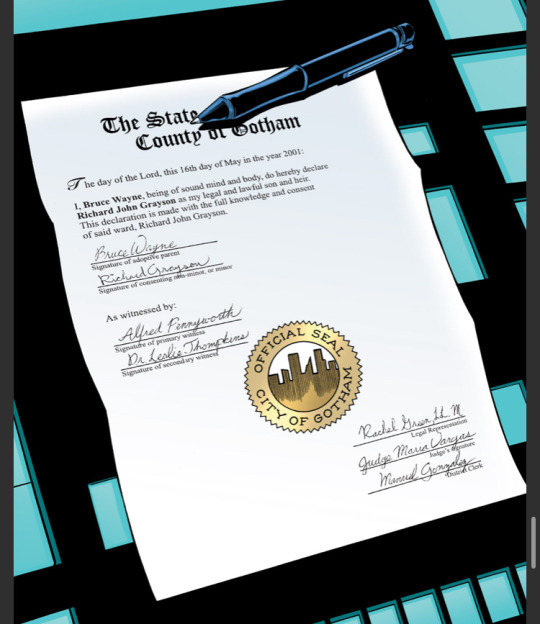
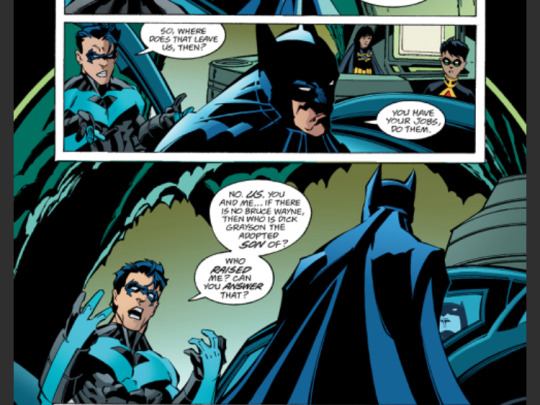
Many fans argue over whether or not Dick is officially adopted, many saying it was never official and he is still just his ward.
Though he does admittedly usually spend the majority of his actual childhood as a ward, Bruce ends up officially adopting Dick as his son(as I have explained before here)in multiple timelines
Barbara Gordon: Not Adopted
(Batgirl and the Birds Of Prey Rebirth)
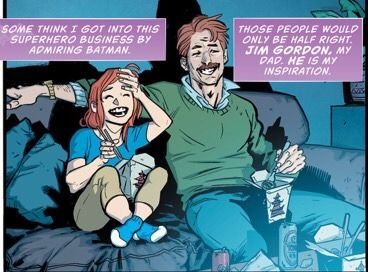
There was never a need for Barbara to be adopted because she still has a Dad. She is however still very much in the BatFamily and has trained under and with Bruce
Jason Todd: Adopted
(The New Titans (1988) #55 and Batman: A Lonely Place of Dying)

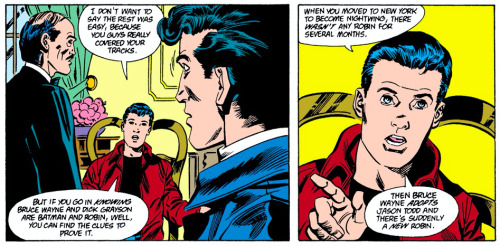
Now I couldn’t track down a comic where we actually get to see Bruce adopt Jason, but there are plenty of instances in which his adoption is referenced -including but not limited to these two- throughout several timelines and reboots
Cassandra Cain: Adopted
(Batgirl 2008 #6)
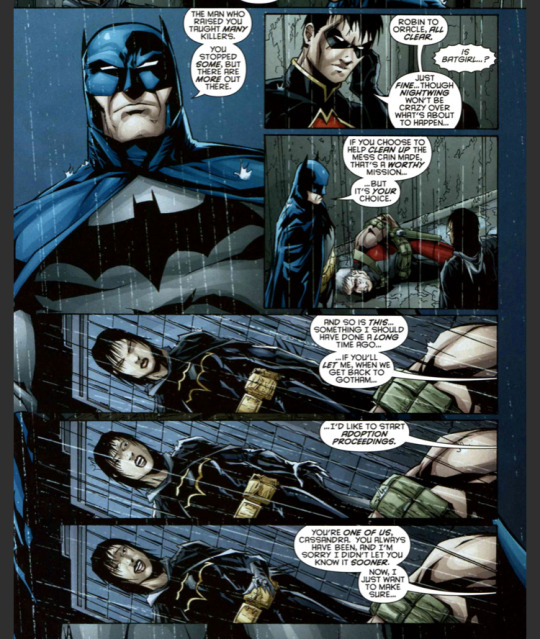
Now this one is a bit more debatable as aside from this one instance, Cass’ adoption is never really mentioned again even after the timeline gets rebooted. Still the general consensus is that Cassandra’s adoption is considered canon.
Tim Drake: Adopted
(Batman #654 and Red Robin #4)
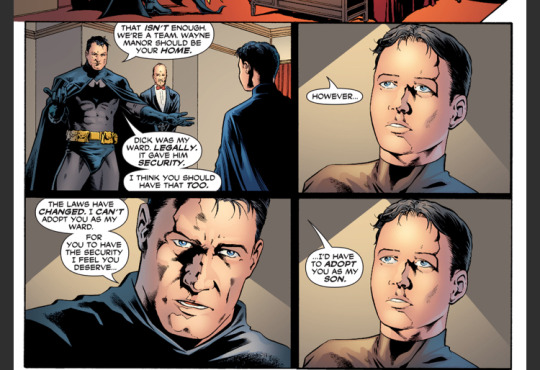
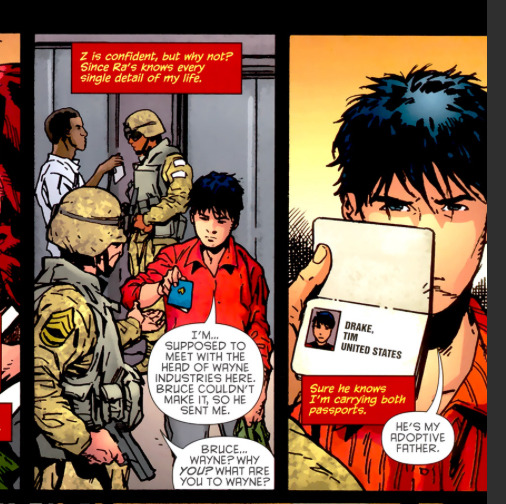
Though Tim declines Bruce’s offer of being adopted at first, we get to see Bruce adopt Tim as his son about a year or so later. His adoption is also referenced across multiple reboots
Stephanie Brown: Not Adopted
(Batgirls #13, Robin (1993) #174, and Robin (1993) #126)
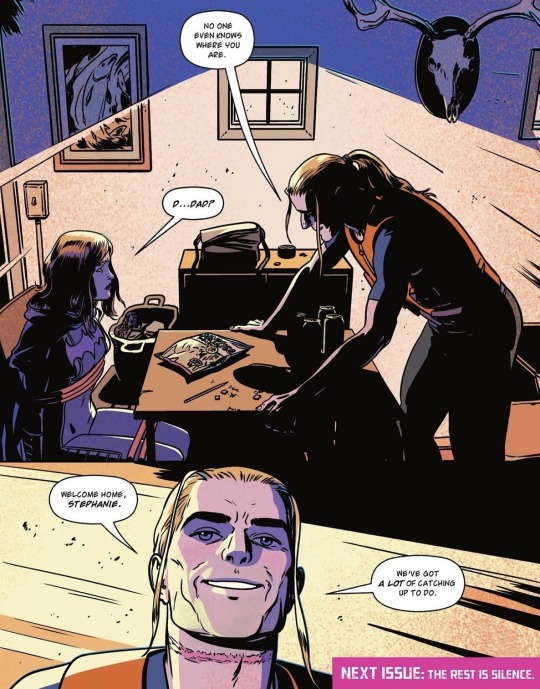
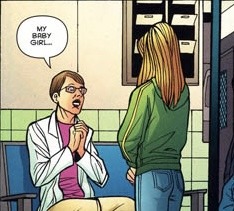
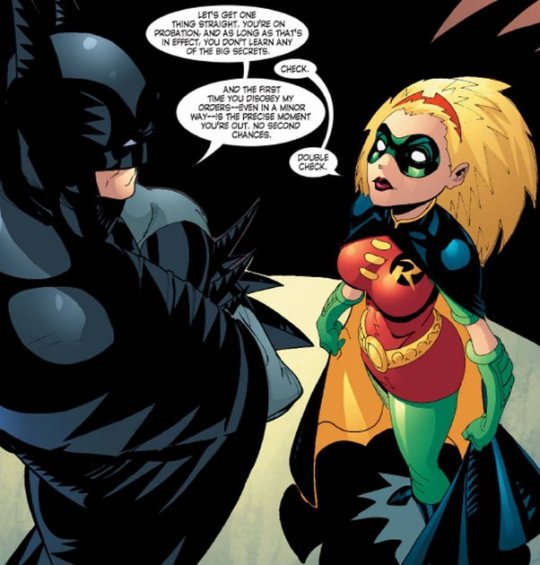
Now the main reason Stephanie is not and probably will not be adopted is because both her parents are alive. While her Dad is a villain and out of the picture, her mother is a nurse and fully capable of taking care of her.
Bruce does however train her during her brief stint as Robin and much like Barbara she is no less apart of the BatFamily, she’s just not in the Wayne Family
Duke Thomas: Not Adopted (technically)
(All Star Batman #1 and Batman & the Signal #3)
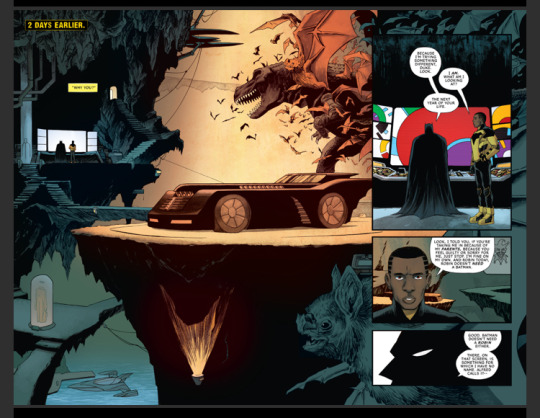
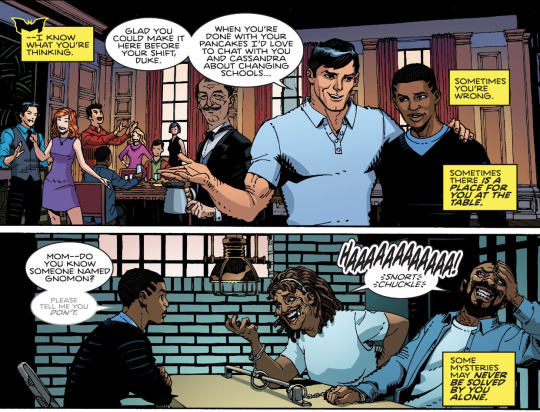
Now Duke is never officially adopted because technically his parents are alive just insane due to Joker’s toxin of which there is no cure. However Bruce does take him in and let him stay at the manor and it is heavily implied he becomes Duke’s foster parent so do with that what you will
Damian Wayne: Not Adopted/Biological child
(Batman and Robin (2011) #0)

Damian is Bruce’s one and only biological child -of the main canon- and therefore does not need to be adopted because you don’t need to adopt your own child
And that’s all of Bruce’s official and unofficial children in the main canon!💕🖤
#Don’t even get me started on the whole Meta verse “everything is canon” nonsense because I straight up don’t even know#I’m pretty sure everyone can pick and choose canon at this point and not be entirely wrong#So don’t let this stop you from head canon-ing your heart away#Babs and Steph not being adopted is a good thing because that would make them brother kissers#don’t take this too seriously#I didn’t have time to go track down more sources so hopefully this is sufficient#batfam#dc comics#bruce wayne#A guide for Bruce Wayne’s children#hope this helps#Honestly I don’t care much either way if people make Duke Bruce’s official son#Pop off#let people enjoy things#canon is a suggestion#I left Damian out once cause I was just doing adopted kids and someone told me I “forgot him”#So he’s here this time#But like I hope everyone knows Damian is not adopted#Ignore my aggressive italicizing#I do it a lot#Batfamily guide
183 notes
·
View notes
Text
Hawkeye and Frank are the two most diametrically opposed characters on Mash. They clash politically, ideologically, emotionally, intellectually, and even physically on more than one occasion. There is virtually nothing they agree on. But they do have one significant similarity: both Hawkeye and Frank are notably, pointedly effeminate.
Hawkeye is the central protagonist, so he's written to be likeable, even admirable, especially in the first five seasons of the show when satire dominated rather than character drama. He's the character who makes the correct political points and voices the show's ideology, and male audience members are encouraged to identify with him and aspire to be like him. He's witty, he's smart, he's charismatic, he dodges consequences a lot, he's highly skilled in his work, and he has a strong personality and natural leadership qualities.
Frank is the main antagonist up until the end of season five. He's written for audiences to hate him, mock him, and occasionally be horrified by him. He's dull-witted, incompetent, awkward, easily led and manipulated, and always gets his comeuppance. Few audience members are likely to aspire to be more like Frank Burns.
And yet, while most likeable protagonist/detestable antagonist duos in American popular media would also be differentiated in terms of gender performance as a matter of course - the effeminate villain being a standard stock character, always set against a ruggedly masculine hero - Mash takes a different approach.
From his core personality as a sniveling, weak-willed follower, to the way other characters, including Hawkeye, routinely make fun of him by comparing him to a woman or insinuating that he's gay, Frank Burns certainly fits the part of weak, emasculated villain. What's more interesting, and much less commonly seen in Hollywood media, is that Hawkeye is portrayed as just as unmanly, and just as, if not more prone to having it pointed out in the show.
Often Hawkeye's jokes at Frank's expense include the implication that Hawkeye is attracted to him himself, and not necessarily as "the man." He jokes, "Guess it's a marriage, Frank. I know I can do better, but at my age, can I wait?" in Hawkeye, Get Your Gun; he switches from calling Frank one of his vampire brides to taking the feminine part in post-coital pillow talk after siphoning his blood in Germ Warfare; he kisses or tells Frank to kiss him in Major Fred C. Dobbs, For the Good of the Outfit, and Bulletin Board, etc.
Other times, the jokes Hawkeye makes about himself are virtually identical to the jokes made at Frank's expense - their respective attractions to Margaret as a potentially dominant sexual partner, eg, with both Frank and Hawkeye portrayed as eagerly submissive. For instance, in 5 O'Clock Charlie Hawkeye jokes about tying Frank to Margaret's tent, then dismisses the thought with, "He'd probably love it. I know I would." And Hawkeye/Trapper and Frank/Margaret are sometimes paralleled as dual couples, Hawkeye and Frank usually being framed as the more feminine partner in each.
And of course, unconnected to Frank, there are many, many more examples of Hawkeye's effeminacy, both in jokes and in personality traits.
Hawkeye is a self-professed coward who is loud and proud about how terrified he is to be stuck in a war zone. He's emotionally open and highly empathetic, always willing to listen to others' problems and discuss (or scream about) his own. He abhors institutional violence and faces every enemy combatant with his hands firmly in the air. When authority is thrust upon him he strives to relinquish it, and uses it as little as possible.
More shallowly, he has little interest in sports and exercise, derides masculine hobby magazines like Field and Stream and Popular Mechanics, is incapable of performing mechanical tasks to the exasperation of others at least four times (Comrades in Arms which explicitly frames this emasculating, In Love and War, Patent 4077, and Hey, Look Me Over), mocks traditional masculinity in many ways, and enjoys musical theatre and Hollywood gossip. And he makes and takes literally hundreds of jokes about being unmanly and having sex with men himself, many more than he makes at Frank's expense.
But while the jokes are at Frank's expense and meant to belittle him, they're rarely made at Hawkeye's expense, especially in the first five seasons. Hawkeye doesn't make the jokes out of self-deprecation, he makes them out of pride and a desire to differentiate himself from the army men he's surrounded by. He's almost always in on the jokes others make about him, rather than offended - Potter telling him to file a paternity suit against his rival in Hepatitis makes him laugh delightedly, and Trapper's remarks on his effeminacy, such as Miz Hawkeye in Hot Lips and Empty Arms, are sometimes lightly teasing but always a regular aspect of their dynamic that Hawkeye enjoys playing up. Frank doesn't make any jokes directly mocking Hawkeye's masculinity that I can recall, beyond vague "pervert" and "degenerate" remarks, which, while often historically homophobic, in the show's context tend to be treated as a reference to his heterosexual endeavours.
Frank's effeminacy is a point of mockery and derision, but Hawkeye's is a point of pride, and not intended to make him any less likeable to an audience. Antagonists don't get to score points off of Hawkeye by mocking his feminine traits, but Hawkeye makes fun of Frank regularly by mocking his feminine traits.
This difference in framing can partially be explained by the nature of their respective gender performances.
While Hawkeye and Frank are both effeminate, they're effeminate in many opposite ways. Frank is weak-willed while Hawkeye is strong-willed. Frank is unappealing to most women, while Hawkeye is something of a lady's man. Frank cannot face his fears to rise to a challenge, but Hawkeye can. But on the flipside, Frank refuses to admit to fear while Hawkeye openly proclaims it. Frank strives to attain authority while Hawkeye refuses it or takes it on only begrudgingly. Frank is obsessed with guns to a freudian extent while one of Hawkeye's most famous monologues of the show is a speech about refusing to carry one. Frank worships the concept of traditional masculinity even while he can't perform it himself, while Hawkeye mocks the concept and would refuse to perform it even if he could.
The Sniper is an excellent case study of these contrasts. In this episode, Hawkeye is effeminate and at ease with it, while Frank is desperate to prove himself masculine. Frank and Margaret flirt with strong Freudian overtones while Frank shoots a gun while nearby Hawkeye flirts with with a nurse with a line about "tasting" her. Hawkeye connects with the nurse he's wooing by relating to how scared she is and huddling in fear with her, while Margaret demands that Frank prove his masculinity by going out and taking down the sniper himself. Frank carries a gun while trying to approach the sniper, while Hawkeye carries a white flag. Frank tries to make fun of Hawkeye for wanting to surrender, but he can't bring himself to approach the sniper while Hawkeye does.
This contrast of gender performance is a consistent aspect of Hawkeye and Frank's dynamic throughout the show, but The Sniper makes it a central theme so it's a useful example to show how their relationships to masculinity are a deliberate aspect of their dynamic.
And while Hawkeye makes fun of Frank's femininity, it's significant that he also regularly makes fun of Frank's masculinity - his love of guns (eg The Sniper), his sexual affairs (eg the exchange about Frank as a "fantastic performer" in Yankee Doodle Doctor), his numerous attempts to exert authority (eg Welcome to Korea), his desire for socially approved success (eg Hot Lips and Empty Arms), etc.
Both masculine and feminine sides of Frank are comprised of negative character traits, while Hawkeye embodies the best of both - emotional expression and healthy ways of coping by talking about his feelings; bravery but not machismo; intelligence and skill as a doctor rather than an officer; empathy and a willingness to listen; sexual prowess but largely through his love of foreplay rather than his dick game (which, in the context of the early 70s, is a somewhat feminine attribute that distinguishes him from a typical traditionally masculine man); etc.
Hawkeye demonstrates some of the most appealing and healthy qualities of both masculinity and femininity while Frank demonstrates, or strives to demonstrate, the more toxic qualities of both. Through including a few positive masculine traits in the mix, the narrative is able to depict Hawkeye as likeable, admirable, and desirable in his effeminacy while Frank is depicted as loathesome in his. Hawkeye gets one of many, many women in The Sniper by showing vulnerability, while Frank only appeals to Margaret, and Margaret is portrayed as borderline pathological in her sexual attraction to violent masculinity (the scene where Frank excites her with his gun, for example, also includes an electra complex joke, and there's a running rape kink gag in this episode as well).
Another aspect to consider when it comes to differentiating Hawkeye and Frank's respective femininities is hypocrisy. Similar to how Frank and Margaret's affair is mocked because they can't admit to it while Hawkeye and Trapper's affairs are glorified, part of what makes Frank's effeminacy so mock-worthy, while Hawkeye's feminine qualities are a source of pride and rebellion, is that Frank refuses to admit to them.
Frank desperately wants to be the ideal heroic army man and often play-acts the part, poorly. When Hawkeye mocks him by calling him a woman, for example, he's drawing attention to Frank's failure to live up to his own ideals. And when Hawkeye calls himself a woman, he's mocking those same ideals. The message is that Frank is pathetic not so much for failing to be traditionally masculine, but for wanting to be traditionally masculine at all.
Ultimately the ways Hawkeye and Frank perform masculinity and femininity are pointedly in opposition, from which masc and fem traits they embody, to how proudly they embody them. The show itself draws attention to these gendered similarities and differences between Frank and Hawkeye through a constant barrage of jokes, and even whole scenes and episodes. In this way the show portrays Frank as a hypocritical loser who wants to be masculine but fails to embody all but the worst traits, and Hawkeye as a cool, admirable guy who disdains the traditional pillars of masculinity and embraces his own effeminacy.
#mash#marley on mash#mash gen#mash gs#frank mash#hawkeye mash#since you guys liked that trapper gender meta a lot more than i thought you would here have another one#though this is written a little less formally lol#i have more examples of whole scenes that make these comparisons than just the sniper but i'm trying to keep this from being#even longer than it already is#but eg white gold is another good example wrt how they relate to flagg; yankee doodle doctor; army navy game; george; the gun; etc etc#(also it's interesting that when frank leaves hawkeye gets the pathetic loser portrayal more often... though i think that's a coincidence#the shift from early to late mash could be yet another essay on mash and gender lol)#long post
273 notes
·
View notes
Text
the appeal for nine and rose for me, is that nine gets to reconnect with the wonders of the universe by seeing it through this young woman's eyes and rose gets to have a fantasy of being taken out of everyday life and see the wonders of the universe, as a simple fairytale/(re)introduction to the world for the audience
the appeal for ten and rose for me, is that they double-down on this premise because it's inevitably going to end and is constantly ticking down to that end throughout this story, and the only way for them to move through life now is to pretend that nothing ever ends which makes them increasingly detached from reality, and is in and of itself a tragedy
the appeal for ten and martha for me, is that ten is spiralling and martha is a doctor to her core, and both of them want to fix everything for everyone else except themselves and so they're mirrors of a similar self-destructive sacrificial drive that makes them orient around each other in an unhealthy coping-mechanism kind of way that martha eventually has to detach herself from, even though there were the wonders...
the appeal for ten and donna for me, is that donna is actually very level-headed, and in many ways very capable, even though she doesn't believe in herself she can make decisions that are healthier than either rose or martha could, and the doctor initially through wanting her to believe in herself forces themself outside of their bubble of despair, which somewhat breaks the cycle of the previous companions (although, not properly until a very long time later)
#rose and the doctor do not work for me if they're not a tragedy -- if the ending isn't fated and they're not running from it#and martha and the doctor... well i need some fucking closure on that one BUT i do like this story a whole lot#i think it is delicious#doctor who#dw#i do think technically martha's story with ten / fourteen / this era is over in a way that is different to donna returning for the specials#but i think if anything could explore her well it's fifteen-era (and hey maybe within that there's an allusion to her seeing donna again#and fourteen by extension)#(but the point is martha and fifteen in my head)#rose tyler#martha jones#donna noble#the doctor#the ninth doctor#the tenth doctor#the fourteenth doctor#doctor who meta
363 notes
·
View notes
Text
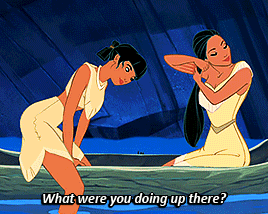
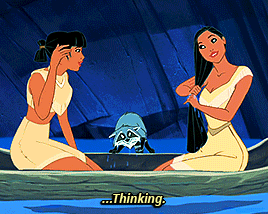



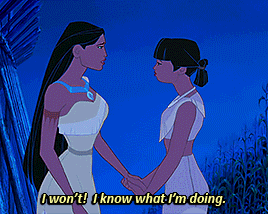
Pocahontas refusing to confide in Nakoma.
Pocahontas (1995)
rambling lil' meta under the cut
i've been thinking a lot about pocahontas's relationship with nakoma and what kind of friends they really are in the context of the film. when we meet them both, pocahontas is elevated and nakoma is in a boat far below her, shouting up to reach her. i think nakoma is always reaching for pocahontas and pocahontas will only reach back sometimes. it's a pretty unbalanced friendship, when you look at it, and i wonder why nakoma remains the main point of contact in the community for pocahontas besides her father. perhaps it's because they're similar ages. maybe they're childhood friends who just got so used to each other that the one may take the other for granted.
pocahontas never confides in nakoma, and you gotta wonder why. even their first interaction has pocahontas demurring when she answers that she was up on the cliff thinking. thinking about what? She doesn't say, but she doesn't refute nakoma's assumptions.
and nakoma...what does she get out of this friendship? maybe she's just used to trailing after pocahontas this way, maybe she just doesn't have another friend, or she thinks pocahontas needs her.
nakoma is sort of a foil for thomas, who trails after john smith like a starry-eyed fanboy with an intense para-social relationship perspective. nakoma also is the active participant in the friendship, not pocahontas. nakoma fills in the gaps of their relationship with assumptions and guesswork, because pocahontas is so reticent, so hesitant to share of herself that nakoma Has to. and when pocahontas's seclusion goes too far, when she fails to confide in nakoma some of the most essential elements of what she intends, nakoma has to fill in the gaps again. and when she does it's Not Good, and her solution is to send their strongest warrior (a man with affection for pocahontas, who might keep her secrets if she needs him to) to try and save her friend. and then it all blows up in their faces and a man lies dead in the water for it.
every relationship in the movie is so tragic like brO—
#pocahontas's whole deal here fascinates me#pocahontas (1995)#disney pocahontas#disney nakoma#pocahontas#nakoma#disney's pocahontas#pocahontasedit#pocahontasgif#disneyedit#disneygif#fyeahpocahontas#disneyfeverdaily#pocahontas meta#queso*edit#queso*gif#help i'm hyperanalyzing disney's pocahontas again#for real tho pocahontas's avoidance tactics are on another level#she's at a point where she can just disappear for a day and a half and everyone will just be like ''she does that''#i have a headcanon that pocahontas and nakoma were also each others' first se/xual experiences as they were growing up#and that nakoma caught feelings and pocahontas didn't#and it was messy and terrible but they stuck around each other anyway#and somehow made it back to friendship#but obviously there's SOMETHING that makes pocahontas feel like she can't truly confide in anyone#except MAYBE grandmother willow#she Thought she could confide in her father and ask his advice but we know how that conversation went#pocahontas is such a profoundly lonely person in a lot of ways#(and so is john smith)
96 notes
·
View notes
Text
One thing that I feel is really interesting and often forgotten about Essek is that fundamentally, his characterization has been from the start based upon his desperation for external perspectives and connection, which, along with much of his narrative and mechanical positioning, means that he actually has an extraordinary and almost (but not actually, as I'll show) counterintuitive capacity for both growth and trust.
(Buckle in. This is a long one.)
In particular, I would argue, knowing now that many places where the plot touches Ludinus have long been marked for connecting back into the current plot, that he was quite possibly built as a prime candidate for radicalization by the Ruby Vanguard. He felt isolated from his culture, he was desperate for other connection, and he was certainly of the type to believe he was too smart to be drawn into such a thing, given his initial belief that he could control the situation and the fallout. If things had gone any other way, he easily could've been on the other side by now.
As such, he has been hallmarked by being fairly open to suggestion, perhaps for this reason, but the thing about that kind of trait is that it is both how people are radicalized and deradicalized. This is certainly true of Essek, who experienced genuine kindness and quite frankly strangeness from the Nein and was able to move from the isolation the Assembly had engendered to meaningful and genuine connection, largely propelled by his own internal reflection. By the time Nein are aware of his crimes, he's already begun to express regret to an extent and, furthermore, doubt in the Assembly, including explicitly drawing a line against Ludinus, even in a position where he was on his own and probably quite vulnerable.
Similarly, when the Nein reach the Vurmas Outpost some weeks later, he has moved from regret for the position he's ended up carrying a heavy remorse. This makes sense! He's fairly introspective, seems used to spending a lot of time in his own head, and was left with plenty to mull over. It's not some kind of retcon for him to have progressed well past where the Nein left him; it just means he's an active participant in the world who has done his own work in the meantime.
This is another interesting aspect to him. I've talked about this a bit before but I cannot find the post so I'll recap here: antagonists in D&D have significantly more agency than allied NPCs. Antagonists are active forces, against which the party is meant to struggle; allies are meant to support the PCs, which means they tend to be more passive in both their actions and their character growth. Essek was both built as an antagonist, in a position that gives him significant agency, and also was then given significant opportunity to grow specifically to act as a narrative mirror for Caleb's arc. Even when he becomes a more traditional D&D ally, he still retains much of that, though he occupies a supporting role.
I believe that this is especially true because of the nature of Caleb's arc, which I've already written on; the tl;dr of this post is that Caleb is both convinced that he is permanently ruined and also desperate to prove that change is possible. Essek is that proof, because he is simply the character in a position to do so. But this also means that his propensity for introspection and openness is accentuated! He has to do the legwork on his own, for the most part, because that's where he is in the meantime.
But he still ends the campaign necessarily constricted; he is under significant scrutiny, he's at risk from the Assembly, and he goes on the run fairly soon after the story ends. He spends most of the final arc anxious and paranoid, which is valid given the crushing reality of his situation. It would be very easy to extrapolate that seven years into this reality, he would be insular, closed off, and suspicious of strangers, even in spite of the lessons he's learned from the Nein and their long term exposure.
So seeing his openness and lightness now is surprising, but at the same time, given this combination of factors in his position in the narrative over time and his defining traits, it's not by any means unreasonable.
But one thing that I found so delightful is how much trust he exhibits, which is obviously a wild thing to say about Essek in particular, given much of what he learns is both earning and offering trust, which was something he says explicitly in 2x124 that he's never really experienced: "I've never really been trusted and so I did not trust." It makes up much of the progression of his relationship with Caleb, and the trust that he is offered by the Nein in walking off the ship is the impetus he needs to grow.
But I think it's easy to talk about trust when it comes to people who have proven themselves to you or to whom you've ingratiated yourself, and that's really the most we can say about Essek by the time he leaves the Blooming Grove. There is this sense in a lot of discussion of trust (not solely in this fandom) that it is only related to either naivete or love, but there's far more to it. Trust at its best is deliberate—cultivating an openness to the world at large is a great way to combat cynicism and beget connection instead. It allows a person to maintain curiosity and be open to experience, but it can be incredibly difficult to hold onto.
It is clear that the Essek we meet now is a very pointedly and intentionally trusting individual. He trusts Caleb and by extension Caleb's trust in Keyleth, as he shows up and picks up a group of strangers from a foreign military encampment and walks in without issue. He trusts the Hells to follow his lead moving through Zadash and to exhibit enough discretion so as to avoid bringing suspicion upon all of them. He trusts that Astrid will respond well to his entrance, but he also trusts himself and the Hells enough to execute a back-up plan in the case that she doesn't. In the end, he even trusts them enough to give them his name and identity.
He doesn't scan as someone who has spent half a dozen years living like a prey animal, afraid of any shadow he runs across in an alley, withdrawn into himself and an insular family, which would've been an easy route for him to take. He scans as someone who has learned the kind of trust borne of learned confidence and a trained eye for good will and kindness, which are crucial weapons one would need for staving off cynicism in his circumstances—as if he has survived thanks more to connection and kindness than paranoia and isolation. (If we want to be saccharine about it, he scans quite poignantly as a member of the Mighty Nein.)
So it is easy to imagine this trust and openness as a natural progression of his initial search for perspectives external to his own cultural knowledge. Though he makes those first connections with the Assembly to try to vindicate his personal hypotheses, he finds in them exposure to the deepest corruption among Exandrian mortals, which could've—and did, for a time—turned him further down that same dark path.
But it's also this same openness to exposure from the wider world that allows the Nein to influence him for the better, and in spite of the challenges he's certainly faced simply surviving over the past seven years, he seems to have held onto this openness enough to move through the world with self-assurance and a willingness to extend the kinds of trust and good will that he has been shown.
(I would be remiss not to mention that I was reminded about my thoughts on this by this lovely post from sky-scribbles and their use in the tags of 'light' to describe Essek's demeanor this episode, which is really such an apt word for it.)
#something something hope is a weapon hope is a discipline hope is a garden to cultivate!!!#HE'S SO GOOD HE IS TRULY EXEMPLAR OF THE WHOLE PHILOSOPHY OF THE NEIN AND I DO NOT THINK THAT'S AN ACCIDENT#truly just like. enormous proponent of letting trust and curiosity into your heart regardless of the horrors.#it's hard and it makes you more vulnerable and sometimes it hurts so so much but it will also save your fucking life!#cr spoilers#critical role#essek thelyss#cr meta#I was gonna apologize for the length but I'm not sorry. I'm also not sorry for being insane about him but he's so special to me.#head in my hands he's so GOOD HE'S BEST BOI! GUIDING LIGHT NORTH STAR!!! LOOK AT HIM!!!#also truly if i had two nickels for a span of time with no essek sightings where I wrote a lot of fic#with deliberate personal acknowledgment that I was writing some pretty maximal arcs for him in terms of character growth#and then end up getting essek for half an episode and having to go OH WE'RE GOING THAT FAR ACTUALLY. FUCKING INCREDIBLE.#yanno. two nickels. but good lord I am thriving that it's happened twice#augh this is ONE of the pieces I need to write this week. we're not gonna talk about it
343 notes
·
View notes
Text
The temptation to make a huge meta post about Caspar is insane… like I was trying to write a fanfic from his pov and I felt like I was making him too analytical (cause I’m too analytical and I project onto characters I write) so I did a little character study… and then did further character studies… and I was like… wait… why is Caspar so fucking interesting???? Like I already liked him…he’s half of my favorite ship for a reason…but like…holy shit…the development put into his character is insane….
Like how he’s not that close to his family but feels personal guilt over his father’s actions… or how incredibly observant he is…or how he cannot pick up on people’s emotions at all…but he’ll notice subtle changes in behavior…which makes his intuition sharp as hell…or how he acts impulsively based on what he believes to be right in the moment without considering consequences…but will reflect on consequences after the fact and take other’s advice into account when he recognizes he needs to change something…
Or how I am super certain he’s not into girls just from the lack of awareness of multiple girl’s romantic feelings towards him…and the fact that the two biggest female charmers (Hilda and Dorothea) don’t even try to charm him because they know it won’t work… or how two separate guys will travel with him to the ends of the earth post-game…
Like I’ve seen so many people call Caspar stupid…like SO many…I even thought of him as “simple”…but like…being impulsive and having straightforward values…isn’t stupidity???? They’re character traits??? I am the dumb one for thinking less of him!!! Caspar is a fascinating character!!! What the heck!!!
#lol i guess i did make a meta post#i saw something recently about people writing linhardt insulting caspar's intelligence#which just straight up never happens#and I was going to reblog that post#before realizing I have a whole lot to say about caspar von bergliez#so i decided to rant in my own post#I actually did do like three separate character studies on him#like wrote out my analysis and everything#i love this character#caspar von bergliez#caspar#fe3h caspar#fe3h#fe3h meta#fe meta#fire emblem three houses#three houses#fe 16#fire emblem#character study#in rant form#lavender posts
121 notes
·
View notes
Text
i know ive vaguely mentioned that jack is putting on his own kind of personality-performance in the same way Dean is but something else I microwave in my head a lot is how he specifically plays it up with cas and performs in a similar way. they’re like two bodysnatchers pretending they’re humans and performing traditions that they think will help them blend in (like Cas calling Jack ‘slugger’ in the tombstone script draft)
I think another aspect of Jacks character that is often forgotten is that he also isn’t entirely human, and that coupled with the general infantilization he gets from the fandom means nobody is really looking very deeply into his behavior or recognizing it as a performance—specifically one that’s rooted in his need to be seen as acceptable and “Good,” and contributes so much to the sensitivity and defensiveness he’s shown to have towards his perceived place in TFW and the Winchester family.
everyone thinks it’s cute and charming that he wanted to match ties with Cas and supposedly has a talking teddy bear toy in 15x11 (the both of which can be seen as part of traditional nuclear family roles just like Cas calling him ‘slugger,’) but when that same episode ends with jack ruefully admitting to cas that he’s going to kill himself as part of Billie’s plan and as a way to atone for the damage he caused, you really have to question the sincerity of his behavior—especially since it’s not even the first time he’s used cutesy charming behavior to essentially manage everyone’s mood and emotions to keep being perceived the way he wants to be perceived at the face value he’s created for himself (unabashedly lying to Sam and Dean about anything happening while he was out with a big smile and an “I promise,” in 14x16, and doing the same thing to Mary in the beginning of 14x17).
another thing is that if jack does feel like he can be himself and also be accepted or even praised for it, like he was in apocalypse world with Mary and the refugees that saw him as a hero, he gets immediately defensive whenever something about his [genuine] self or his capability is questioned; he gets upset at Mary for not thinking that he can beat Michael alone and blows up at Cas for thinking he’s too weak to do anything by himself as a human being, and in both of these instances he switches tones a lot between a very deadpan and blunt when he’s essentially unmasking, vs a soft one when he’s trying to be reassuring and acceptable.
it adds a lot to his identity crisis in the beginning of s14 and especially to his soulless arc, when he’s basically desperate to get back into the traditional Good Son role he’s gotten even though his own subconscious outright mocks him for it and calls him pathetic for even wanting to be that person again


*which jack also becomes increasingly defensive and blatantly aggressive about.
im losing the plot because of my stomach hurting so TLDR jack is basically a bodysnatchers playing house the same way Castiel is amen godbless peace be with you all
#I haven’t written a proper jack thesis in forevgerrre#ive abandoned my boy#for another boy who’s very similar to him in ways I cannot be normal about#cal.txt#spn#supernatural#spn meta#it also doesn’t help that a LOT of his infantilization directly comes from the teddy bear quote and nobody seeing it as a whole lie lmao#but then again why would you need to look deeper into the character you assume is a stupid little baby ….#many such cases#jack kline#castiel#cas and jack#dadstiel#spn analysis#jack meta
159 notes
·
View notes